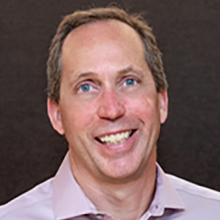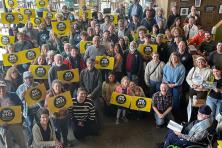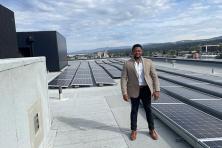It’s one of those beautiful sunny August days in the Pacific Northwest that should be a reward for the damp and dark we endure a lot of the year. But at the moment, I’m not feeling gratitude for the great weather. Instead, as I sit here trying to gather my thoughts about the struggle to address climate change in a world transformed by the coronavirus pandemic, I am filled with a difficult mix of emotions, including something that feels a lot like despair.
This isn’t at all what I imagined when 2020 began. For the climate movement, this year arrived with incredible promise and excitement. In Washington State, we were coming off passage of the nation’s strongest 100 percent clean electricity bill. Across the country, the number of people in favor of action on climate change had reached an all-time high and was the number one priority for Democratic voters for the first time. I was more confident than ever that we were poised to achieve some of the significant policy changes we have worked towards for years.
Then the COVID-19 pandemic hit, followed by waves of Black Lives Matter demonstrations in response to the murders of George Floyd, and Breonna Taylor, and too many others.
Now, the pandemic is raging across much of the country unchecked. While polling confirms that voters have shifted their attitudes about race in this country, many of the changes to address racism we have seen so far are more symbolic than substantive. Meanwhile, the Trump administration continues to respond with lies, cynicism, and contempt for our democracy.
I know this sounds bleak. But I also feel a strong measure of hope and purpose. Out of sickness and death, economic disruption, and social isolation has emerged a new focus on what is important in our lives, greater visibility into racial injustice in American society, and a new willingness to pursue systemic change to address the challenges we face—including the climate crisis.
Don’t get me wrong. The pandemic has been devastating to the work of creating a clean energy future. Since COVID-19 hit, we have lost more than 600,000 jobs in the clean energy sector. Companies have scaled back operations and investments in clean energy innovation. Many potentially game-changing startups will never get off the ground. Climate change seems like it can no longer be the priority that it was at the beginning of the year as we turned our attention to the impact of coronavirus and racism on our lives and the economy.
Yet something profound has shifted. Dramatically higher rates of COVID-19 infection and death for Black communities, indigenous nations, and people of color in this country have brought into starker relief the long truth that systemic racism forms the very foundation of our politics, our economy, and even the climate movement.
This has brought a broad shift in our awareness of the interconnectedness of the challenges we face. For those of us who didn’t fully grasp it before, there is now no denying that we cannot equitably solve the climate crisis without addressing how this country was built on deep disregard for the lives of Black and brown people just as much as it has on deep indifference to the natural environment.
With this awareness comes the possibility of moving forward with the kind of systemic solutions that are needed to create a society and an economy built on racial justice and climate justice. This difficult period has opened the door to new possibilities.
I believe more strongly than ever that the best way to stave off devastating and deadly climate change and have a resilient economy with local good jobs and address long-term racial inequities is to build an economy that runs on 100 percent clean energy.
This is only achievable if the process of transformation itself is a driver of economic opportunity and societal change; if the transformation for individuals, businesses, and communities is not a hardship; and if the benefits—whether it’s jobs or cleaner air and water—reach everyone, beginning and especially with those who have unfairly borne the brunt of the damage built by environmental racism and the fossil fuel economy.
This is why we are committed to developing equitable clean energy solutions that will benefit everyone. It’s the reason we advocate for legislation and policies that will make the innovations required more scalable and affordable. And it’s why we are focused on building networks and coalitions dedicated to accelerating the transition to 100 percent clean energy.
We do this as we have always done with a focus on the Pacific Northwest. Our wind and water, our history of innovation, and our connection to the environment puts us in an ideal position to lead the way forward. The region’s success in stopping coal export projects and Governor Brown’s recent executive order on climate in Oregon are just two examples of how the Pacific Northwest can be a catalyst for the rest of the country.
And we do this by helping build bridges between those who often seem on opposite sides of a deep divide—whether it’s urban centers and rural communities, business and labor, activists and politicians, or the traditional environmental movement and communities of color.
In particular, it is vital that we are honest about our failure to acknowledge the contributions, leadership, and priorities of communities of color. For people like me who have been a part of what has been a white-led and white-centered movement since its modern-day inception, we need to recognize how we benefit from the system and our role in helping to preserve it. Then we must listen with enough honesty, openness, and humility to ensure that the solutions we champion are fundamentally designed with the understanding that there can be no climate justice without racial justice.
We stand at a critical and dangerous turning point for this country and for the struggle to prevent catastrophic climate change. The COVID-19 crisis will continue to worsen as the Trump administration and others continue to treat it as politics rather than a public health emergency. The economic impact of the pandemic will continue to overwhelm most other policy concerns. Systemic inequities mean Black communities, indigenous nations, and people of color will continue to suffer disproportionately from COVID-19. And the November election will dominate the news. Meanwhile, we continue to pump carbon pollution into the air.
We must resist the temptation to imagine that climate change is one thing too many for people to handle. Now is the moment to push through the door that has opened and work for solutions that address the systemic nature of all the problems we face—including climate change.
Your help is essential. Here are three things you can do to make a difference, helping draw more of these connections into actions:
1. Be an active, committed participant in our democracy: Vote! Encourage your family, friends, neighbors, and colleagues to vote. Let candidates know that your support depends on their commitment to climate and racial justice.
2. Support the struggle for racial justice. There are so many great organizations on the frontlines doing important anti-racist working here in the Northwest. If you aren’t involved already here are suggestions in the Pacific Northwest:
- Give to Front and Centered’s Frontline Response Fund: Our friends at Front and Centered have put together the Frontline Response Fund. Front and Centered is a coalition of over 60 grassroots organizations, many of whom are on the frontlines of the pandemic. Supporting the Frontline Response Fund is providing support to hundreds of people dealing with lay-offs, school closures, medical issues and other factors related to coronavirus in communities throughout Washington State.
- Donate to support the Oregon Worker Relief Fund: Causa, Latino Network, Voz Worker Education Project, and Pineros y Campesinos Unidos del Noroeste (PCUN) have created this fund to get dollars in the hands of Immigrant Oregon workers who are being left out of the Federal Stimulus package. 100% of the donations will go directly to community members in need who cannot access unemployment insurance benefits.
3. Get ready to push for climate progress after the election. November 4 could bring a once-in-a-lifetime opportunity to implement major change. To prepare, we’re developing significant proposals on clean transportation, buildings, and clean electricity. We’ll need you to keep the pressure on to ensure that these proposals become the framework for a clean energy future that creates healthier communities and a more vibrant and just economy.
As always, I am grateful for your commitment to building a 100% clean energy future for everyone. More than ever, I look forward to working with you to make this vision a reality.





